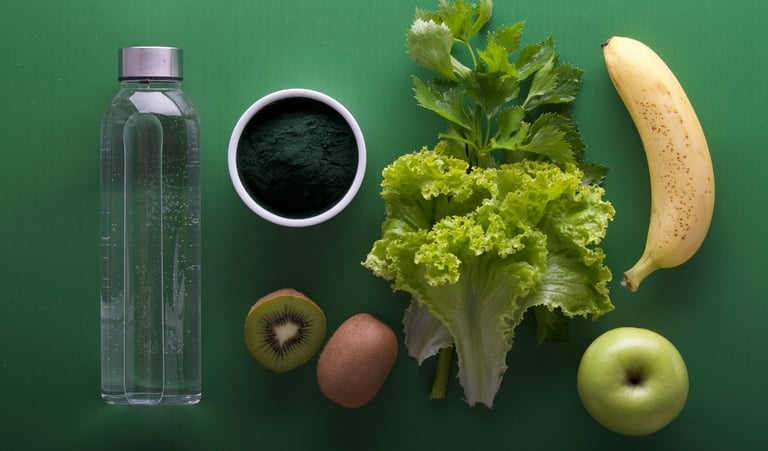A Beginner's Guide to Gut Health: Signs of Trouble and How to Heal
A balanced diet high in fibre and fermented foods, probiotics and prebiotics, stress management, getting enough sleep, and staying hydrated are all ways to improve gut health.
HEALTH, WELLNESS & LIFESTYLE
9/14/20254 min read
Signs Your Gut is Unhealthy and What to Do About It
Ever feel like something is just... off? Maybe you're constantly tired, your skin is acting up, or your stomach seems to have a mind of its own. You might be surprised to learn that the cause of these issues could be lurking in your gut. Gut health is about more than just digestion; it's a foundation of your entire well-being. Your gut is home to trillions of microorganisms, collectively known as the gut microbiome, that influence everything from your immune system to your mood.
When this delicate ecosystem is out of balance, it can set off a chain reaction throughout your body. The good news? Your body is great at sending signals when things aren't right. The key is learning to listen. In this guide, we'll explore the top signs that your gut is crying out for help and provide a practical roadmap to get it back on track.
Signs of an Unhealthy Gut
Your gut is like the command center for your health, and when it's off, you'll notice some signs. If you're frequently dealing with digestive issues like gas, bloating, or heartburn, that’s a big red flag.
Unexplained weight changes can also point to gut problems, as an unhealthy gut messes with nutrient absorption and fat storage. Feeling tired all the time, even after a good night's sleep? It might be linked to your gut not producing enough serotonin, which affects your mood and sleep quality. Skin issues like acne or eczema can also stem from gut problems, as inflammation may lead to skin irritation. If you're experiencing mood swings, anxiety, or brain fog, remember that your gut health can impact your mental well-being too.
New food intolerances can arise when your gut's beneficial bacteria decrease, making it harder to digest certain foods. Lastly, if you feel like you’re always catching colds, it could mean your gut health is affecting your immune system. Keeping your gut happy leads to better overall health!
How to Heal Your Gut: A Practical Guide
Feeling a little called out by the signs above? Don't worry! Rebalancing your gut is entirely achievable with some targeted dietary and lifestyle changes. Here’s your action plan.
1. Revolutionize Your Diet
The diet you follow is the greatest influence for shaping your gut microbiome.
Focus on a diverse diet rich in whole foods, especially fruits and vegetables. The variety provides a wide range of nutrients and fibers that good bacteria love. Prebiotic fiber is the preferred food for your beneficial gut bacteria such as asparagus, bananas, garlic, onions, and whole grains.
Fermented foods like yogurt, kefir, kimchi, sauerkraut, and kombucha are natural sources of probiotics—the good bacteria themselves. Avoid fried, processed, and sugary foods that provide energy to the bad bacteria in your gut.
2. Consider Strategic Supplementation
Sometimes, your gut needs a little extra boost to get back in balance. This is where high-quality supplements can make a world of difference. A high-quality probiotic supplement can help repopulate your gut with beneficial bacteria. Look for a supplement with a high CFU (colony-forming units) count and multiple strains, particularly Lactobacillus and Bifidobacterium. Think of prebiotics as fertilizer for the good bacteria already in your gut. A prebiotic supplement, often containing fibers like inulin or FOS, ensures those good microbes have plenty to eat.
If you struggle with bloating and gas right after eating, you might benefit from digestive enzymes. These supplements help your body break down fats, proteins, and carbs more effectively, easing the burden on your digestive system.
3. Master Your Lifestyle
Gut health isn't just about what you eat; it's about how you live.
Chronic stress wreaks havoc on your gut. Incorporate stress-reducing practices into your daily routine, such as meditation, deep breathing exercises, yoga, or simply spending time in nature. Apps for guided meditation can be a fantastic resource.
Get 7-8 hours quality sleep per night. Poor sleep can negatively impact your gut microbiome, so create a relaxing bedtime routine and stick to a consistent schedule. Drink plenty of water for the mucosal lining of the intestines and helps balance the good bacteria in the gut.
Regular, moderate exercise contributes to a healthier gut by increasing microbial diversity. Find an activity you enjoy and make it a consistent part of your week.
The first and most crucial step to healing is being aware of the signs of an unhealthy gut. With conscious changes in your diet, adding specialized supplements, and lifestyle modification, you can nourish a healthy inner ecosystem. Bear with your body during the healing process, and acknowledge small wins along the way—less bloating, increased energy, and improved skin. Your gut will be grateful!
Your Journey to a Healthier Gut Starts Now
Recognizing the signs of an unhealthy gut is the first and most important step toward healing. By making mindful changes to your diet, incorporating targeted supplements, and adjusting your lifestyle, you can cultivate a thriving internal ecosystem. Be patient with your body as it heals, and celebrate the small victories along the way—less bloating, more energy, and clearer skin. Your gut will thank you for it!
Disclaimer: This blog post is for informational purposes only and does not constitute medical advice. Please consult with a healthcare professional before making any significant changes to your diet or starting a new supplement regimen.


Contact us
contact@talksntrends.com
+923003210007
© 2025. All rights reserved.
Follow us
